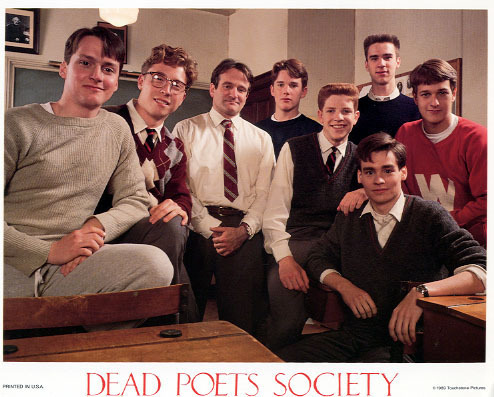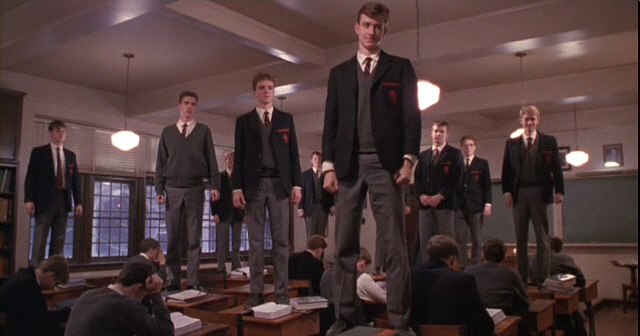 |
| Carpe Diem! |
When one thinks of the word education, one most
often imagines students sitting at desks practicing language, mathematics,
science, and history. This image captures much of the modern public education
experience, in which students gain knowledge in an approved set of subjects in
order to pursue a career or college degree. This conventional approach to
education is turned on its head, however, in the coming of age classic, Dead Poets Society. Over the course of
the film, charismatic English teacher John Keating instills in his students a
passion for “poetry, beauty, romance, love…what we stay alive for”, and teaches
them that education is about far more than facts and figures. By the film’s end, even the most hardened viewers will
be tempted to seize the day and make their lives extraordinary.
The film begins at the start of the school year at
the fictional 1950’s preparatory school, Welton Academy. The film immediately introduces the audience
to the drudgery of life at Welton as the boys start the year with formal
welcoming ceremonies and introductions to rigid courses. The atmosphere at the
school quickly changes, however, when the students attend their first session
of Keating’s (Robin Williams) poetry class and discover that their teacher
possesses even more contempt for the school’s restrictions than they do.
Keating’s first lesson includes instructing students to tear the foreward
chapters out of their textbooks and reminding them of the importance of ‘carpe
diem’, or seizing the day.
Over the course of the school year, Keating’s
teachings prove to have an immense effect upon his students, as he consistently
encourages them to challenge themselves and pursue a passion for life. Anxiety
ridden Todd (Ethan Hawke), for instance, slowly emerges from his emotional
shell and discovers both a talent for poetry and the confidence to pursue a
social life on campus. Similarly, dutiful son Neil (Robert Sean Leonard) attains
the courage to defy his father (Kurtwood Smith) and pursue his passion for
acting, while awkward Knox (Josh Charles) uses his new knowledge of poetry to
woo a girl (Alexandra Powers) at the nearby public school. Even the popular and
charismatic group leader, Charlie, (Gale Hansen) steps outside of his comfort
zone as the class clown to revive Keating’s old club, the Dead Poets Society.
The club quickly becomes a haven for the boys, in which they can temporarily
escape from their controlled lives through the freedom of literature. Obstacles
arise, however, when the administration becomes critical of Keating’s methods and
the nonconformity that they are inspiring in his students. Tragedy strikes when one
student finds himself unable to reconcile the life of choice and opportunity
that Keating has shown him with the constrained existence that society is
forcing upon him. The ensuing ramifications force both students and teacher to
confront the restrictions of the outside world and question the merits of a
'live to the fullest' philosophy.
 |
| Oh captain, my captain |
Although numerous films have chronicled the
influence of passionate teachers upon their students, few have done so as
effectively or realistically as Dead
Poets Society. Unlike other teaching films, which show students accepting a
new teacher’s unique philosophy almost overnight, Keating’s class initially
scoffs at his unconventional ideas before slowly incorporating them into their
daily lives. Similarly, the students’ views evolve over time, rather than
changing in an immediate revelation, as they come to terms with the hindrances of
the privileged lives that their parents have planned for them. The film is
particularly realistic in its inclusion of students who have not been
influenced by Keating. Cameron, for example, proves to be the
group’s skeptic throughout the story when he hesitates before joining the club
and later betrays Keating in order to avoid being punished by the
administration. Cameron’s presence reveals that while Keating is an effective
teacher, he is not perfect and cannot reach every student. As a
result, the story remains relatable without compromising its inspiring message.
In an effort to appeal to modern audiences, many
recent school films focus upon teachers working with at-risk urban students.
Although these films tell important and interesting stories, they often portray
characters as types instead of people, and define them by the topical issue that
they represent. After seeing numerous films that have
resorted to stereotyping, it is refreshing to see a school film that avoids tacking
on current issues in favor of telling a compelling story. Because the boys each
have their own distinct personalities, it is much easier for the audience to be
engaged in their activities than if they were relegated to the roles of stock
characters such as “the teen parent”, “the drug addict”, or “the gang member”. The film’s efforts to create an
original narrative are further aided by its setting. By setting the story at a
boarding school, the screenplay can place almost total focus upon the students
without involving their families and back stories. Similarly, the 1950’s
setting enables the narrative to place the black and white views of
the administration in the greater context of the severe views of Cold War America
. Through its combination of dynamic
characters and a rich sense of time and place, the film provides audiences with
an engrossing story that relates an important message without sacrificing any
subtlety.
The cast provides excellent performances that are by
turns comical, charismatic, compelling, and haunting. Robin Williams perfectly
captures the spirit of adventure that enables Keating to inspire his students,
while also imbuing him with the necessary wisdom to lend his advice
merit. Robert Sean Leonard nearly captures the film from Williams as he shows
the torment behind Neil’s easy going persona. Gale Hansen and Josh Charles
provide necessary comic relief in their portrayals of rebellious Charlie
and awkward, love-struck, Knox. Ethan
Hawke’s role as cripplingly shy Todd is truly a
breakout performance in which he speaks volumes as a man of few words.
Dead
Poets Society has remained a favorite amongst teachers
and students since its initial release in 1989. The film has lost none of its
resonance over the years, and its central message of ‘seize the day’ remains as
crucial as ever. Through its realistic portrayal of adolescent confusion and
discovery, the film reminds us of our own search for identity and the
importance of remaining true to ourselves as we grow older. Join Keating
and his class as they live deliberately and suck the marrow out of life.
They just might teach you to look at the world in a different way.
 |
| No matter what anyone tells you, words and ideas can change the world |

Ethan Hawke is soooooon dreamy *swoons* Great article Miss-E. I haven't seen this film, yet, but now I think I will
ReplyDeleteBe careful, it might want to make you stick to teaching! And there is no disputing the Hawke's dreaminess
ReplyDelete